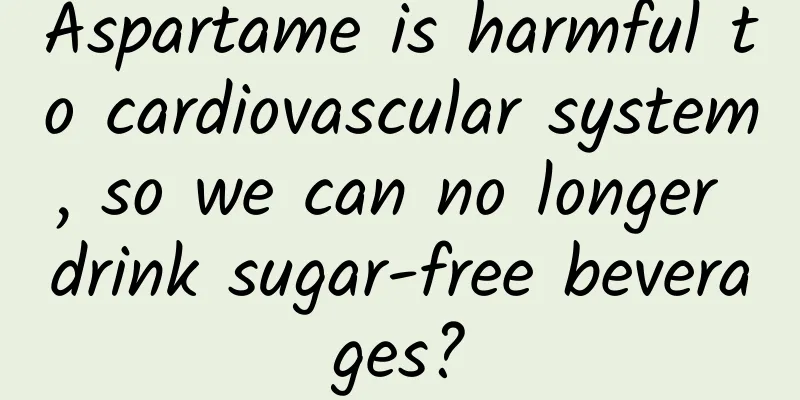Aspartame is harmful to cardiovascular system, so we can no longer drink sugar-free beverages?

|
Studies have found that aspartame can damage the cardiovascular system. Should we stop drinking sugar-free beverages? The latest Chinese research published in the Cell journal found that aspartame can aggravate atherosclerosis and damage the cardiovascular system through an insulin-dependent mechanism. As a result, some people are afraid to drink beverages with sugar substitutes. Rumor Analysis This statement is an over-interpretation of the research results. This study was an animal study, and the experiment used a special type of laboratory mouse that is naturally prone to heart disease. The results obtained cannot be simply applied to humans. In fact, under normal dietary conditions, the amount of aspartame people consume is completely within the safe range. Currently, more than 90 countries in the world allow aspartame to be used in a variety of foods, and as long as it is used reasonably, it can be guaranteed to be safe. In addition, aspartame is very sweet, and the taste becomes bitter if used too much, so there is no need to worry about exceeding the standard in a normal diet. Under the trend of "sugar control", various sugar-free foods and beverages are highly sought after by everyone. They are characterized by high sweetness and "0 calories". Among them, various sweeteners (sugar substitutes) play a major role, and aspartame is the most famous one. However, there is news recently that China's latest research published in the cell journal found that aspartame can aggravate atherosclerosis and damage cardiovascular system through insulin-dependent mechanism. This makes many people who like to drink sugar-free beverages feel nervous again: What is this research about? Is aspartame safe? Can we still drink sugar-free beverages? Article title screenshot Let me first state the conclusion. Drinking some sugar-free beverages in moderation does not need to worry about aspartame exacerbating atherosclerosis. The shocking conclusion that has been widely circulated online is an over-interpretation of a normal research result. Let me explain it in detail. What is this study about? First of all, it must be pointed out that this latest study is an animal study and does not involve humans. The researchers conducted experimental models on mice and monkeys respectively. Screenshot of the original paper title Scientists conducted an experiment on the sugar substitute aspartame: after feeding mice and monkeys food containing this sweetener, they found that their insulin levels (an important hormone for controlling blood sugar) quickly increased. For further research, they chose a special type of mouse - these mice were genetically modified and were naturally prone to vascular problems, similar to human arteriosclerosis. The experiment lasted for three months, and the mice were fed aspartame (about 600 mg) every day, which was equivalent to an adult drinking 3 cans of sugar-free cola. The results showed that compared with ordinary mice, the blood vessels of mice eating aspartame accumulated more plaques (similar to scale in water pipes), these plaques were larger in size, and the inflammatory response in the body was more obvious. This finding suggests that long-term consumption of artificial sweeteners may affect cardiovascular health through this special mechanism. However, it should be noted that the experimental subjects were mice, and the impact on humans needs further verification. However, when discussing this study online, rigorous and comprehensive statements are often omitted directly, and it is simply said that sugar-free beverages can also harm the cardiovascular system, be detrimental to blood vessels, and harm the heart. Screenshot of the original paper title So, does aspartame really harm the cardiovascular system and increase the risk of atherosclerosis and cardiovascular disease? What do you think of this research? First, this study is an animal study - mice and monkeys, and this result has not been confirmed in humans. There are still big differences between animals and humans. So far, no human studies have found that sugar-free beverages can harm cardiovascular health. Second, the mice used in this study are a special type of experimental mice - ApoE-/- mice, which are naturally prone to heart disease even on a normal diet. This type of mouse was specially bred by scientists to study cardiovascular disease. Even if they eat ordinary food, their total cholesterol is as high as 300-500 mg/dL. If they are fed a high-fat diet, their cholesterol level can even exceed 1000 mg/dL, which will accelerate the process of atherosclerosis. This chaotic metabolic state will gradually accumulate fatty plaques on the blood vessel walls, forming atherosclerosis. The reason why scientists prefer to use this type of mouse for experiments is that they can quickly simulate the decades of vascular damage in humans. For example, after feeding a high-fat diet, obvious plaques can be seen in 12 weeks, which is very convenient for testing cholesterol-lowering drugs or studying the pathogenesis. However, such a mouse model may not be able to fully simulate the occurrence and development of human atherosclerosis. Image from the paper Third, in the section on limitations of the study, the paper not only reiterates the limitations of animal research, but also clearly mentions that due to technical difficulties and feasibility limitations, the current study did not evaluate the direct effects of aspartame on atherosclerosis in the monkey model. Image from the paper It seems that we don’t have to be afraid of sugar-free drinks anymore. But some friends may still ask, even if it does not cause cardiovascular problems, is aspartame itself safe? Is Aspartame Safe? Aspartame is an artificial sweetener. You can think of it as a "super sugar" - it has only 1/200 of the calories of ordinary sugar, but it can bring 200 times the sweetness. This feature makes it a frequent guest in foods such as sugar-free cola, chewing gum, and low-calorie snacks. rId9 Picture Library Copyright Image, reprinting and use may cause copyright disputes Regarding safety, food safety agencies in more than 90 countries around the world have reached a consensus: normal consumption of aspartame is safe. For example, after decades of research, the U.S. Food and Drug Administration (FDA) and the World Health Organization (WHO) have determined that adults will not have health risks if they consume no more than 40 mg per kilogram of body weight per day (equivalent to a 60-kilogram person drinking 9 cans of sugar-free cola per day). The latest assessment of the World Health Organization in 2023 reconfirmed this conclusion. Although rumors of "aspartame causing cancer" occasionally appear on social media, so far, all authoritative studies have found no evidence that aspartame is harmful to the human body at normal doses. However, it should be noted that people with phenylketonuria (a rare genetic disease that cannot metabolize phenylalanine normally) must avoid eating foods containing aspartame. Of course, this does not mean that healthy ordinary people can consume aspartame without restraint. Scientists specifically remind that the safety conclusion of aspartame is based on "reasonable use". In addition, even if aspartame itself is safe, it may still have other effects on our health. Because sugar-free beverages using aspartame, long-term and large-scale drinking may affect taste preferences and make people more and more dependent on sweets. This may make us more inclined to look for other sweets, indirectly increasing the risk of consuming high-sugar foods. Therefore, whether it is a drink or food, in addition to reducing sugar, we must also pay attention to reducing excessive addiction and dependence on sweetness, such as trying to replace sweet drinks with water and tea in daily life. In summary, there is no need to worry about safety issues when aspartame is used reasonably. However, for the sake of health, we should also pay attention to adjusting our taste and not develop a habit of being addicted to sweets. Looking in the mirror of rumors Many of these rumors are the result of over-interpretation of real research. In this regard, you might as well ask the following questions: Is this study based on humans? How many samples are there in this study? Are there other studies that support this conclusion? Are there other studies that contradict this conclusion? If you are not familiar with scientific research, you can also try these questions: Is the media that published the sensational conclusion authoritative enough? Did they provide key paragraphs from the original paper as evidence? If the answer to these two questions is no, then you can remain skeptical and see what trustworthy professional media say. References [1] Wu W, Sui W, Chen S, Guo Z, Jing X, Wang X, Wang Q, Yu 19:S1550-4131(25)00006-3. doi: 10.1016/j.cmet.2025.01.006. Epub ahead of print. PMID: 39978336.↑ [2] FDA. Aspartame and Other Sweeteners in Foodhttps://www.fda.gov/food/food-additives-petitions/aspartame-and-other-sweeteners-food ↑ Planning and production Author: Ruan Guangfeng, Deputy Director of Kexin Food and Health Information Exchange Center Review | Zhang Yu, researcher/PhD, Chinese Center for Disease Control and Prevention, national health science expert Planning丨Ding Zong Editor: Ding Zong Proofread by Xu Lai and Lin Lin |
>>: You may have seen these 13 big birds, but you may not know them丨International Bird Day
Recommend
China Passenger Car Association: Auto sales in February 2025 hit a record high for the month, with 7 out of every 10 cars sold being domestically produced
According to the latest data from the China Passe...
Sunflower Remote Control Software 8.5 Free Download: Supports Enterprise-level Applications such as File Distribution and Message Management
Recently, Sunflower remote control software relea...
What genes of ancient humans are flowing in us?
Homo is a genus of the family Hominidae in the or...
Why mobile game developers need to take piracy seriously
By now, almost everyone in the mobile space has h...
The number of followers increased by 100,000. This is how Zhihu operates and promotes!
[Zhihu, is it worth doing? " Before answerin...
How to use data to drive operational growth
Maybe we won’t get a satisfactory result immediat...
How to generate high-quality backlinks for SEO?
Off-site SEO can also be said to be search engine...
Shenzhou's naked attack on Uber: poor marketing without regard for appearances
Sometimes the difference between good marketing a...
Messi wins the World Cup! It turns out that the 22 players on the field are not playing with the same ball?
Audit expert: Liu Yuhang PhD, Beijing Internation...
Nokia launches Android tablet: Escape and comeback
Only half a year after selling its device and ser...
How to use Zhihu promotion to efficiently attract targeted users?
“Zhihu, share your newly made story with the worl...
Tencent advertising skills and common problems!
This article shares with you some difficult probl...
Uber's new vice president Frye: Former CEO Kalanick may return
Frye said: "Kalanick also wants the best for ...
Data analysis: How to analyze the effectiveness of activities?
Scenario restoration: A music APP offers a 7-day ...
11 fragments of observations and thoughts about B station
Bilibili has been around for 11 years. As a senio...









![Public account big V [Understand the leading stocks] Fupange column group + course](/upload/images/67cc0fbfa0f28.webp)